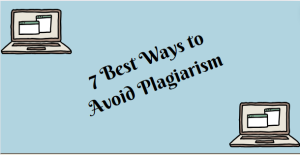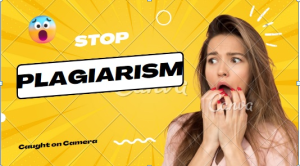Do you know the best ways to avoid plagiarism? Writing an article, statement of purpose or any subject is so essential to humanity considering its advantages which include education, information, or what have you. However, lit is not permitted by law to write or copy what has been aforementioned or written by other people without acknowledging them. It is tantamount to stealing and is punishable by law. At this juncture, what readily comes to mind is plagiarism. When we talk of plagiarism, what exactly do we mean? What does plagiarism represent? This is where the definition of plagiarism comes in to play. For a better understanding of this discourse, it is reasonably necessary to define the word plagiarism.
Plagiarism can be defined as upholding or claiming someone else’s brainchild as your own by failing to give proper credit to the original owner. Plagiarism often shows up under different names: misappropriation, faulty citation, copyright, and infringement, literary theft, imitation, cheating, cribbing, and stealing, to name a few. However, I should point out that plagiarism is a theft and is liable to sanction or penalty. As a result, proper citation or credit should be given to the original owner in order to avoid sanctions or imprisonment. The under listed form the basis for plagiarism avoidance.

Start Early
Give yourself ample time for research and writing. Rushing can lead to relying too heavily on a single source or copying to meet deadlines Rushing limits your ability to explore a variety of credible sources. With more time, you can delve deeper, gather a well-rounded understanding, and develop a stronger foundation for your own ideas.
Cite Correctly
Citing correctly is essential for avoiding plagiarism because it gives credit to the original source and shows you’ve done your research. It also allows readers to find the source you used to verify the information or explore it further. The following are deeper dives into citing correctly which is understanding the citation style and these include; (MLA, APA, Chicago). Following the format ensures proper credit is given and plagiarism avoided.
Paraphrase Effectively
Paraphrasing effectively is a key strategy in avoiding plagiarism and demonstrating your understanding of the source material. It involves taking someone else’s ideas and expressing them in your own words, while still conveying the original meaning accurately. Don’t just swap synonyms. Reword the sentence structure, change the order of ideas, and express the concept in your own voice, while still citing the source. That way, you’ve effectively paraphrased your article and at the same time, avoided plagiarism.
Quote Strategically
Use quotes sparingly for impactful phrases or when the original wording is essential. Remember to cite the source within the quotation marks. Absolutely! Strategic quoting helps in using quotations deliberately and effectively to enhance your writing, rather than simply relying on them. Don’t quote everything. Reserve quotes for specific situations where they add significant value. Strategic quoting is a valuable tool, but it shouldn’t dominate your writing. Strive to paraphrase effectively and express your own ideas in your own words. like l said earlier, quotes should be used sparingly to enhance your points, not replace your own analysis. By grasping these methods, you can leverage quotes strategically to add depth and credibility to your writing while maintaining originality and avoiding plagiarism.
Take Thorough Notes
While researching, jot down key ideas in your own words. This clarifies understanding and helps you avoid accidentally copying source material. Taking thorough notes is a crucial skill for absorbing information effectively and avoiding plagiarism. l just listed few note taking methods that will benefit you in the long run. these are; active listening and engagement, capturing key ideas and concepts, use abbreviations and shorthand, distinguish between facts and opinions, review and revise. Having a comprehensive understanding of these tips and experimenting with different note-taking methods, you can develop a system that works best for you. Thorough notes will not only improve your understanding and retention of information but also serve as a valuable resource when avoiding plagiarism by helping you distinguish your own ideas from those of your sources.

Present your own ideas
Don’t forget to include your own ideas in your writing. This is what makes your work original. Use the information you’ve gathered from your sources to support your own ideas, but don’t just rely on them. There’s nothing so inspiring as your own brainchild so embrace it.
Use a plagiarism checker
Plagiarism checkers are tools that can help you identify potential plagiarism in your writing. They can’t tell you for sure whether or not you’ve plagiarized, but they can help you spot areas where you might need to cite your sources or rephrase your writing. Today, there are many free and paid online plagiarism checkers that can help one to avoid plagiarism. For instance, plagiarism.org and the likes. One can decide to use any of the available tools in order to minimize plagiarism.
Finally on Best Ways to Avoid Plagiarism
Conclusively, the tips contained in this article can help you avoid plagiarism. The increasing rate of plagiarism has formed a social menace as this engages institutions and publishers. . However, by following these tips, you can be very sure that your writing is original and free of plagiarism.
